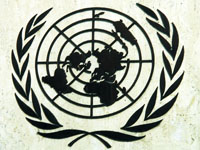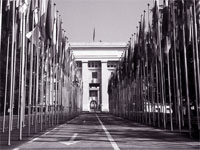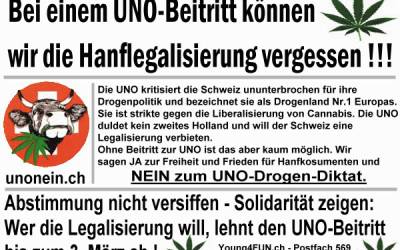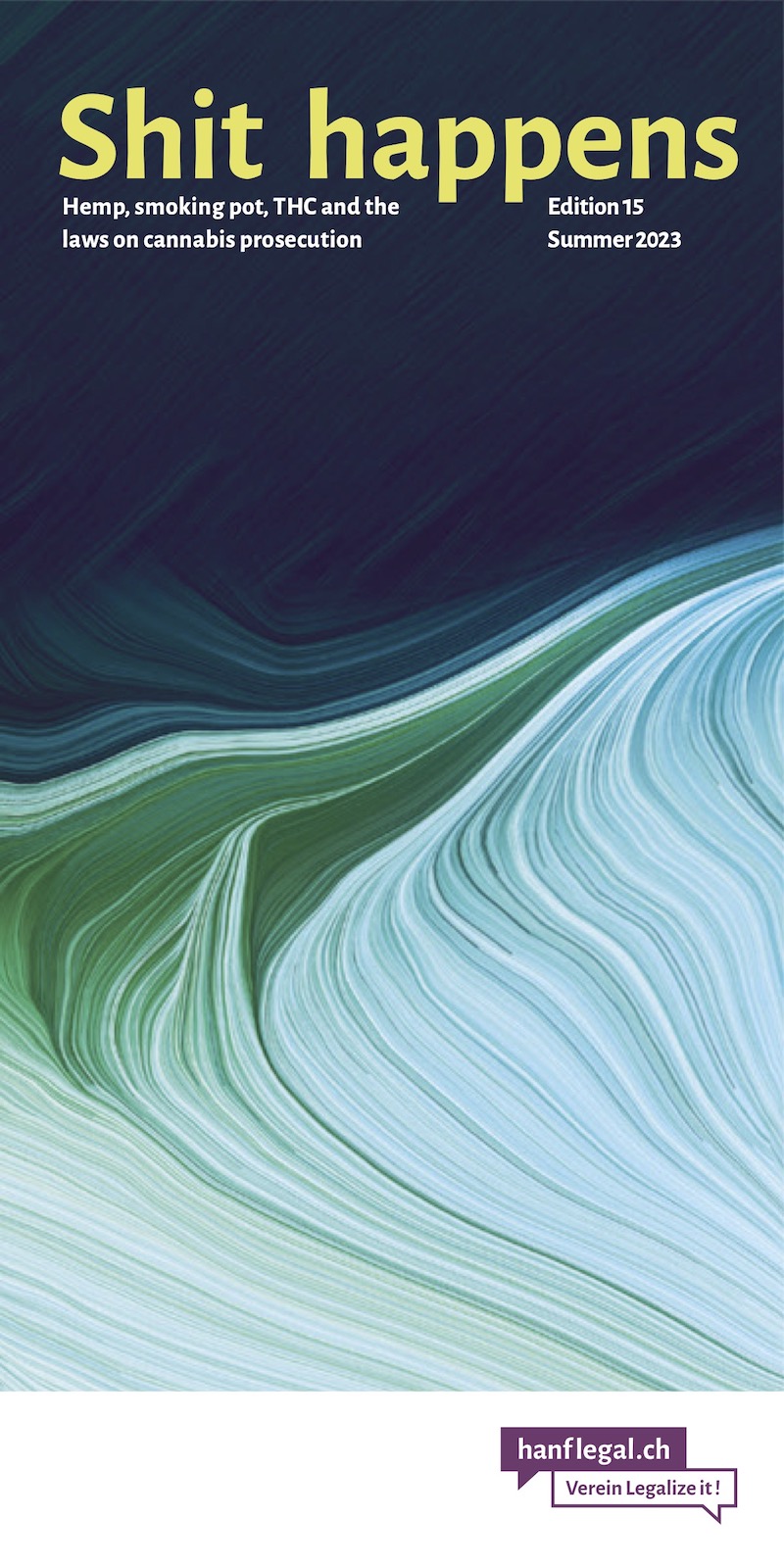- THC & Law:
Smoking pot in the UN
So now it wants to become a member after all: Switzerland will be the 190th country to join the UN in the fall of 2002. So far, the UN's drug policy has been geared toward repression - what does accession mean for the legalization discussions in Switzerland?
UN drug policy is a disaster
In the run-up to the vote on Switzerland's accession to the UN, various questions arose. Should the stoners be in favor of joining an organization that still demonizes hemp and fights legalization? It is clear that the current unspeakable law was created under great pressure from the UN controlled by the USA and that the UN commissions (under American leadership) want to impose their narcotics policy on the world. It is also clear that from the UN side cannabis has been pilloried several times. All these international agreements that Switzerland has unfortunately signed - why aren't they simply cancelled when they have proven to be wrong and pointless? The proposal for the revision of the Narcotics Law can only not implement the legalization (which is considered correct by many) because these international treaties stand in the way. This is the only reason why one comes up with such a strange idea as the opportunity principle for trafficking (we have compiled an in-depth analysis of the Federal Council's message in the last legal aid brochure “shit happens…”).
Is the accession the disaster?
Is the flyer we have pictured above correct in its thrust? Was it wrong to join the UN? If you take a closer look at the authors of the flyer, however, you will see that it is circles close to the SVP that have led this campaign “If we join the UN, we can forget about hemp legalization”. These are exactly the circles that always fight the loudest against even the smallest improvement for us pot smokers and our dealers. This makes it look like a deceptive package. Vote catching in the hemp scene.
What is the problem?
Basically, I don't think the UN is the main problem. The main problem is the international treaties (many of which date back to times when there was no UN). But Switzerland has already signed these treaties - even without being a member of the UN (and, by the way, it already finances the UN Commission on Narcotics (CND) without being a full member of the UN). All of these treaties have denunciation articles with a notice period of about one year in most cases. For example, in the 1961 Single Convention, there is Article 46, “Termination”: “1) After the expiration of two years from the date of entry into force (…) any Contracting Party (…) may denounce this Convention by depositing an instrument to that effect with the Secretary-General. 2) If the Secretary-General receives the denunciation before July 1 or on that date, it shall take effect on January 1 of the following year; if he receives the denunciation after July 1, it shall take effect as if it had been received before July 1 or on that date in the following year.”
The termination is possible
It is therefore possible to terminate these treaties without further ado. By the way, these cancellations would still be possible if Switzerland now becomes a member of the UN. The only thing that would have to be there would be the political will to cancel these moronic treaties that hinder the legalization of hemp. And this political will is missing in Switzerland, because many people are still against a legalization. One argument against the cancellation of the treaties is that they also “regulate”/prohibit many other things besides hemp and that one does not want to cancel the regulations on heroin, cocaine etc. just because of the legalization of hemp. But this is only half the truth. Even if one did not want to change anything in the international conventions concerning hard drugs, there would be an easy way. Pakistan, Bangladesh and India have also signed the treaties, but have put a reservation in which they want to keep the use of cannabis products also for non-medical purposes (so Switzerland could denounce the treaties and ratify them again right away with such a reservation - and then legalize hemp).
What would be the consequences?
What would the UN say to such a move? That is certainly a big unknown. The International Narcotics Control Board, which constantly monitors drug policies around the world and regularly admonishes countries that deviate from its totally repressive ideas, has no sanctioning power in itself. It can only prepare reports and publish them, it can report to the UN General Assembly and blacken countries. For example, just the other day. In its statement number 503, the Drug Control Council stated: “The Council notes with concern that the cultivation and sale of cannabis in Switzerland has currently developed into a large gray market. Further liberalization, as is currently under discussion with the decriminalization of cannabis cultivation and trafficking, would not only be contrary to the provisions of the 1961 Convention, but could exacerbate the problem instead of solving it. The Council is concerned about the possible longer-term outcomes of cannabis policies in Switzerland, the dangers of large-scale smuggling of cannabis products out of Switzerland, and “drug tourism.” The Council urges the Swiss authorities to take the above concerns into account when deciding on the revision of the 1951 Swiss Narcotics Law, specifically regarding the cultivation of cannabis, its sale, as well as its possession.” It never ceases to amaze that grown people can write such nonsense. But that the country, which is regularly pilloried by such an organization, then pays for this nonsense borders on masochism. A denunciation/amendment of the international drug conventions would certainly give rise to some worldwide discussions. But if we want to have reasonable regulations about hemp in our law, we will not get around these discussions anyway.
There are several international agreements on drug policy
Under Overview of international conventions (0.812.121ff) you will find the collection of international treaties on health. We are then mainly concerned with the conventions that begin with 0.812. Central are the 1961 Single Convention, the 1971 Psychotropic Convention, the 1961 and 1972 Supplementary Conventions to the Single Convention, and the 1988 Convention against Illicit Traffic in Narcotic Drugs and Psychotropic Substances. Switzerland has already ratified all but the 1988 Convention. UN drug policy is changing (although even more slowly than Swiss drug policy). Since the USA has not paid its membership fees, it has been kicked out of various UN commissions. This could lead to a renewal, especially since in recent years the UN has mentioned education, prevention and therapy as elements of drug policy in addition to repression.
A renewal of international drug policy?
As a member of the UN, Switzerland can certainly explain its much more advanced drug policy to the rest of the world better than if it were still on the outside. But whether international drug policy will really move away from pure repression to a more intelligent policy, as Switzerland is at least trying to do, is still completely open.
Support our work with a donation:
Bank transfer
Account number (IBAN):
CH02 0900 0000 8709 1354 3
Full account details
Or scan this QR code with your eBanking App (ZKB, Revolut, Postfinance, …):

Or open/share the QR code as PDF file with your eBanking App.
Credit card
Donate via credit card
Verein Legalize it!
Quellenstrasse 25
8005 Zürich
Threema ID 7NH65RBY
Don’t miss anything! Follow us on social media:



